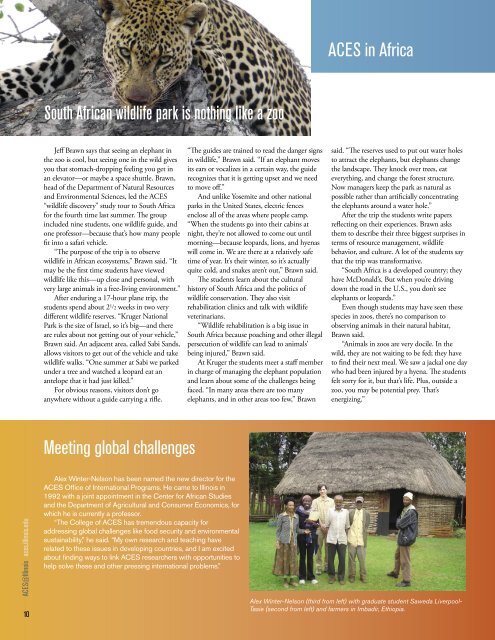t7W0J
t7W0J
t7W0J
Create successful ePaper yourself
Turn your PDF publications into a flip-book with our unique Google optimized e-Paper software.
ACES in AfricaSouth African wildlife park is nothing like a zooJeff Brawn says that seeing an elephant inthe zoo is cool, but seeing one in the wild givesyou that stomach-dropping feeling you get inan elevator—or maybe a space shuttle. Brawn,head of the Department of Natural Resourcesand Environmental Sciences, led the ACES“wildlife discovery” study tour to South Africafor the fourth time last summer. The groupincluded nine students, one wildlife guide, andone professor—because that’s how many peoplefit into a safari vehicle.“The purpose of the trip is to observewildlife in African ecosystems,” Brawn said. “Itmay be the first time students have viewedwildlife like this—up close and personal, withvery large animals in a free-living environment.”After enduring a 17-hour plane trip, thestudents spend about 2 1 / 2 weeks in two verydifferent wildlife reserves. “Kruger NationalPark is the size of Israel, so it’s big—and thereare rules about not getting out of your vehicle,”Brawn said. An adjacent area, called Sabi Sands,allows visitors to get out of the vehicle and takewildlife walks. “One summer at Sabi we parkedunder a tree and watched a leopard eat anantelope that it had just killed.”For obvious reasons, visitors don’t goanywhere without a guide carrying a rifle.“The guides are trained to read the danger signsin wildlife,” Brawn said. “If an elephant movesits ears or vocalizes in a certain way, the guiderecognizes that it is getting upset and we needto move off.”And unlike Yosemite and other nationalparks in the United States, electric fencesenclose all of the areas where people camp.“When the students go into their cabins atnight, they’re not allowed to come out untilmorning—because leopards, lions, and hyenaswill come in. We are there at a relatively safetime of year. It’s their winter, so it’s actuallyquite cold, and snakes aren’t out,” Brawn said.The students learn about the culturalhistory of South Africa and the politics ofwildlife conservation. They also visitrehabilitation clinics and talk with wildlifeveterinarians.“Wildlife rehabilitation is a big issue inSouth Africa because poaching and other illegalpersecution of wildlife can lead to animals’being injured,” Brawn said.At Kruger the students meet a staff memberin charge of managing the elephant populationand learn about some of the challenges beingfaced. “In many areas there are too manyelephants, and in other areas too few,” Brawnsaid. “The reserves used to put out water holesto attract the elephants, but elephants changethe landscape. They knock over trees, eateverything, and change the forest structure.Now managers keep the park as natural aspossible rather than artificially concentratingthe elephants around a water hole.”After the trip the students write papersreflecting on their experiences. Brawn asksthem to describe their three biggest surprises interms of resource management, wildlifebehavior, and culture. A lot of the students saythat the trip was transformative.“South Africa is a developed country; theyhave McDonald’s. But when you’re drivingdown the road in the U.S., you don’t seeelephants or leopards.”Even though students may have seen thesespecies in zoos, there’s no comparison toobserving animals in their natural habitat,Brawn said.“Animals in zoos are very docile. In thewild, they are not waiting to be fed; they haveto find their next meal. We saw a jackal one daywho had been injured by a hyena. The studentsfelt sorry for it, but that’s life. Plus, outside azoo, you may be potential prey. That’senergizing.”Meeting global challengesACES@Illinois aces.illinois.edu10Alex Winter-Nelson has been named the new director for theACES Office of International Programs. He came to Illinois in1992 with a joint appointment in the Center for African Studiesand the Department of Agricultural and Consumer Economics, forwhich he is currently a professor.“The College of ACES has tremendous capacity foraddressing global challenges like food security and environmentalsustainability,” he said. “My own research and teaching haverelated to these issues in developing countries, and I am excitedabout finding ways to link ACES researchers with opportunities tohelp solve these and other pressing international problems.”Alex Winter-Nelson (third from left) with graduate student Saweda Liverpool-Tasie (second from left) and farmers in Imbadir, Ethiopia.


